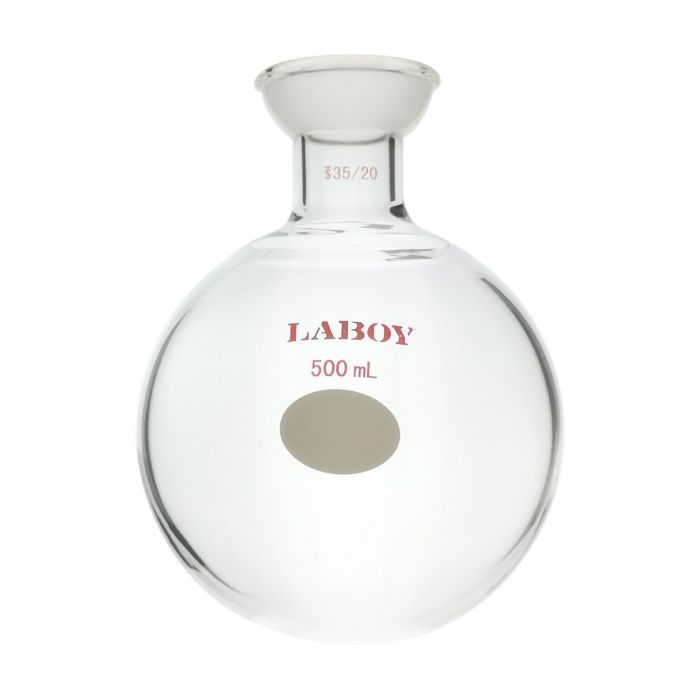Single Neck Round Bottom Boiling Flask With 35/20 Spherical Joint 500ml
Special Price $21.66 Regular Price $33.51
- STANDARD SIZE--- This round bottom flask designed with 35/20 standard spherical socket joint,interchangeable,leak-free,comparing to common boiling flask without ground joint, it is convenient,safe,easy-operation in laboratory glassware setup.Capacity of 500mL.
- HEAT-RESISTANT DESIGN ---With spherical bottoms,this RBF is more resistant to fracturing under vacuum, as a sphere more evenly distributes stress across its surface. Laboy glass flasks are heavy wall designed,made by hand-blowing to ensure uniform wall thickness, made of high-quality borosilicate glass and annealed at 800 degree Celsius ,can be heated directly in an open flame and can withstand typical laboratory thermal variations in Chemistry processes like heating and cooling.
- WIDELY USED----The round bottom flask is widely used in organic chemistry,in a distillation or vacuum distillation apparatus ,it鈥檚 used a a distillation flask and receiving flask with a glass condenser and some adapters like the 3 way distillation adapter,take-off adapter;In a reflux process,it鈥檚 used as a reaction flask with a reflux condenser.It is also used as a Distilling flask in rotary evaporators.
- HEAVY WALL ---Laboy glass flasks are heavy wall design , made by hand-blowing according to ASTM E438 ,made of high-quality borosilicate glass and annealed at 800 degree Celsius ,can be heated directly in an open flame and can withstand typical laboratory thermal variations in Chemistry processes like heating and cooling,durable and reusable.
Round-bottom flasks (also called round-bottomed flasks, Flasks, round bottom, or RB Flasks)having spherical bottoms are more resistant to fracturing under vacuum, as a sphere more evenly distributes stress across its surface. Because of the spherical bottom, cork rings are needed to keep the round bottom flasks upright,or heated by the water bath ,oil bath or sand bath.When in use, round-bottom flasks are commonly held at the neck by flask clamps on a stand.
The flasks are usually used in heating or boiling a liquid, in distillation as distilling flasks and receiving flasks for the distillate, used as the distilling flasks in rotary evaporators.It is usually used with other jointed lab glassware like glass condenser,separatory funnels,cow receivers.
The round bottom flask has larger heating surface than the flat bottom flask and can be heated evenly.It is usually used in the laboratory operation requiring high temperature and long time heating,or vacuum distillation.
The flask with spherical joint is designed with a 35/20 spherical socket joint on the neck,which will attach any apparatus with 35/30 ball joints.a pinch clamp for spherical joint is used to connect the joints firmly.
Laboy glass flasks are heavy wall designed,made by hand-blowing to ensure uniform wall thickness, made of high-quality borosilicate glass and annealed at 800 degree Celsius ,can be heated directly in an open flame and can withstand typical laboratory thermal variations in Chemistry processes like heating and cooling.
The flasks are usually used in heating or boiling a liquid, in distillation as distilling flasks and receiving flasks for the distillate, used as the distilling flasks in rotary evaporators.It is usually used with other jointed lab glassware like glass condenser,separatory funnels,cow receivers.
The round bottom flask has larger heating surface than the flat bottom flask and can be heated evenly.It is usually used in the laboratory operation requiring high temperature and long time heating,or vacuum distillation.
The flask with spherical joint is designed with a 35/20 spherical socket joint on the neck,which will attach any apparatus with 35/30 ball joints.a pinch clamp for spherical joint is used to connect the joints firmly.
Laboy glass flasks are heavy wall designed,made by hand-blowing to ensure uniform wall thickness, made of high-quality borosilicate glass and annealed at 800 degree Celsius ,can be heated directly in an open flame and can withstand typical laboratory thermal variations in Chemistry processes like heating and cooling.

